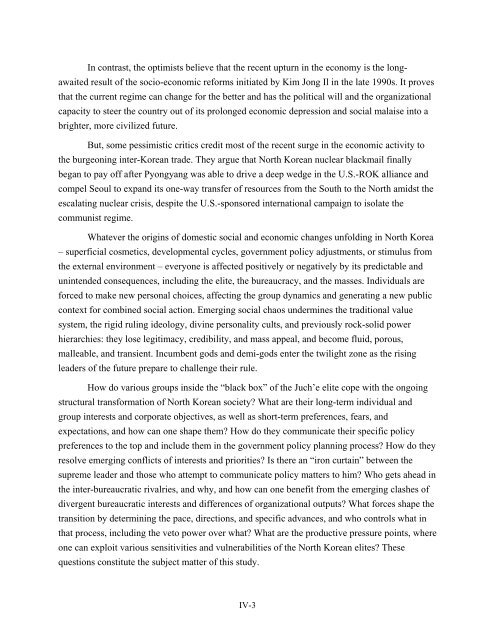North Korean Policy Elites - Defense Technical Information Center
North Korean Policy Elites - Defense Technical Information Center
North Korean Policy Elites - Defense Technical Information Center
Create successful ePaper yourself
Turn your PDF publications into a flip-book with our unique Google optimized e-Paper software.
In contrast, the optimists believe that the recent upturn in the economy is the longawaited<br />
result of the socio-economic reforms initiated by Kim Jong Il in the late 1990s. It proves<br />
that the current regime can change for the better and has the political will and the organizational<br />
capacity to steer the country out of its prolonged economic depression and social malaise into a<br />
brighter, more civilized future.<br />
But, some pessimistic critics credit most of the recent surge in the economic activity to<br />
the burgeoning inter-<strong>Korean</strong> trade. They argue that <strong>North</strong> <strong>Korean</strong> nuclear blackmail finally<br />
began to pay off after Pyongyang was able to drive a deep wedge in the U.S.-ROK alliance and<br />
compel Seoul to expand its one-way transfer of resources from the South to the <strong>North</strong> amidst the<br />
escalating nuclear crisis, despite the U.S.-sponsored international campaign to isolate the<br />
communist regime.<br />
Whatever the origins of domestic social and economic changes unfolding in <strong>North</strong> Korea<br />
– superficial cosmetics, developmental cycles, government policy adjustments, or stimulus from<br />
the external environment – everyone is affected positively or negatively by its predictable and<br />
unintended consequences, including the elite, the bureaucracy, and the masses. Individuals are<br />
forced to make new personal choices, affecting the group dynamics and generating a new public<br />
context for combined social action. Emerging social chaos undermines the traditional value<br />
system, the rigid ruling ideology, divine personality cults, and previously rock-solid power<br />
hierarchies: they lose legitimacy, credibility, and mass appeal, and become fluid, porous,<br />
malleable, and transient. Incumbent gods and demi-gods enter the twilight zone as the rising<br />
leaders of the future prepare to challenge their rule.<br />
How do various groups inside the “black box” of the Juch’e elite cope with the ongoing<br />
structural transformation of <strong>North</strong> <strong>Korean</strong> society? What are their long-term individual and<br />
group interests and corporate objectives, as well as short-term preferences, fears, and<br />
expectations, and how can one shape them? How do they communicate their specific policy<br />
preferences to the top and include them in the government policy planning process? How do they<br />
resolve emerging conflicts of interests and priorities? Is there an “iron curtain” between the<br />
supreme leader and those who attempt to communicate policy matters to him? Who gets ahead in<br />
the inter-bureaucratic rivalries, and why, and how can one benefit from the emerging clashes of<br />
divergent bureaucratic interests and differences of organizational outputs? What forces shape the<br />
transition by determining the pace, directions, and specific advances, and who controls what in<br />
that process, including the veto power over what? What are the productive pressure points, where<br />
one can exploit various sensitivities and vulnerabilities of the <strong>North</strong> <strong>Korean</strong> elites? These<br />
questions constitute the subject matter of this study.<br />
IV-3













